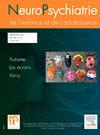Les fonctions exécutives et leur influence sur les performances académiques chez les enfants d’âge scolaire en Tunisie
Q4 Medicine
Neuropsychiatrie de l''Enfance et de l''Adolescence
Pub Date : 2025-01-01
DOI:10.1016/j.neurenf.2024.11.008
引用次数: 0
Abstract
Objectives
Executive functions are essential cognitive abilities that help children adapt to the school environment, thus facilitating their academic success. This study used a correlational approach to examine the relationship between executive functions and academic performance in school-aged children in Tunisia. The focus was on understanding how different components of executive functions, such as working memory (WM), mental flexibility, and inhibition, relate to achievement in core subjects including language-related subjects, mathematics, and sciences.
Patients and methods
A sample of 180 children, aged 7 to 12 years old, was assessed using the Behavioral Rating Inventory of Executive Function (BRIEF) which was filled out by both parents and teachers. The BRIEF is a well-established tool for evaluating executive functions in children and provides a comprehensive view of their behavior in different settings.
Results
The analysis showed strong correlations between working memory (WM) and performance in language arts and mathematics, as reported by teachers. Correlations were weaker for mental flexibility and inhibition in language arts and moderate for mathematics. Parent evaluations revealed generally weaker correlations in language arts, though moderate correlations were found for mathematics. No significant correlation was identified for science across all executive functions assessed in both types of evaluations. Additionally, other executive functions, such as planning/organization, showed strong correlations with language arts and mathematics in teacher evaluations and moderate correlations in parent evaluations. Inhibitory control displayed strong correlations with language arts and mathematics according to teachers but more moderate correlations in parent evaluations.
Discussion
The results revealed notable variability between teacher and parent assessments. Teachers reported stronger correlations between executive functions and academic performance. The lack of significant correlations for science in both evaluations contrasts with conclusions typically reported in the literature. These discrepancies may be explained by the use of different assessment tools in various studies, cultural factors, or specific characteristics of science instruction in Tunisia within the context of this sample.
Conclusion
Executive functions play a key role in primary school students’ academic success. Understanding their link to academic performance would help identify students in need of additional support and facilitate the implementation of targeted remediation programs. Future research should consider factors that influence the assessment of these functions. Furthermore, exploring the relationship between executive functions and academic achievement through predictive models would represent a promising avenue to analyze their potential to predict academic performance in the medium term.
行政职能及其对突尼斯学龄儿童学习成绩的影响
目的执行功能是帮助儿童适应学校环境的基本认知能力,从而促进他们的学业成功。本研究采用相关方法来研究突尼斯学龄儿童的执行功能与学业表现之间的关系。研究的重点是了解执行功能的不同组成部分,如工作记忆(WM)、心理灵活性和抑制力,与核心科目(包括语言相关科目、数学和科学)的成绩之间的关系。采用由家长和老师共同填写的执行功能行为评定量表(BRIEF)对180名7 ~ 12岁儿童进行评估。简要报告是一种完善的评估儿童执行功能的工具,并提供了他们在不同环境下的行为的全面视图。结果分析显示,工作记忆(WM)与教师报告的语言艺术和数学成绩之间存在很强的相关性。语言艺术方面的心理灵活性和抑制力的相关性较弱,数学方面的相关性中等。父母的评价显示,在语言艺术方面的相关性普遍较弱,尽管在数学方面发现了中度相关性。在两种类型的评估中,没有发现科学与所有执行功能之间的显著相关性。此外,其他执行功能,如计划/组织,在教师评价中与语言艺术和数学表现出很强的相关性,在家长评价中表现出适度的相关性。抑制控制在教师评价中与语言艺术和数学表现出较强的相关性,而在家长评价中表现出较弱的相关性。讨论结果揭示了教师和家长评估之间的显著差异。教师报告说,执行功能和学习成绩之间存在更强的相关性。在这两项评估中,科学方面缺乏显著的相关性,这与文献中通常报道的结论形成了对比。这些差异可能是由于在不同的研究中使用不同的评估工具、文化因素或本样本背景下突尼斯科学教学的具体特征所造成的。结论执行功能在小学生学业成功中起关键作用。了解他们与学习成绩的联系将有助于确定需要额外支持的学生,并促进有针对性的补救计划的实施。未来的研究应考虑影响这些功能评估的因素。此外,通过预测模型探索执行功能与学业成绩之间的关系,将为分析其预测中期学业成绩的潜力提供一条有希望的途径。
本文章由计算机程序翻译,如有差异,请以英文原文为准。
求助全文
约1分钟内获得全文
求助全文
来源期刊

Neuropsychiatrie de l''Enfance et de l''Adolescence
Medicine-Pediatrics, Perinatology and Child Health
CiteScore
0.60
自引率
0.00%
发文量
61
期刊介绍:
Organ of the Société française de psychiatrie de enfant et de adolescent, Neuropsychiatrie de enfance et de adolescence tackles all fields of child-adolescent psychiatry and offers a link between field and clinical work. As a reference and training tool for students and practitioners, the journal publishes original papers in child psychiatry as well as book reviews and conference reports. Each issue also offers a calendar of the main events dealing with the speciality.
 求助内容:
求助内容: 应助结果提醒方式:
应助结果提醒方式:


